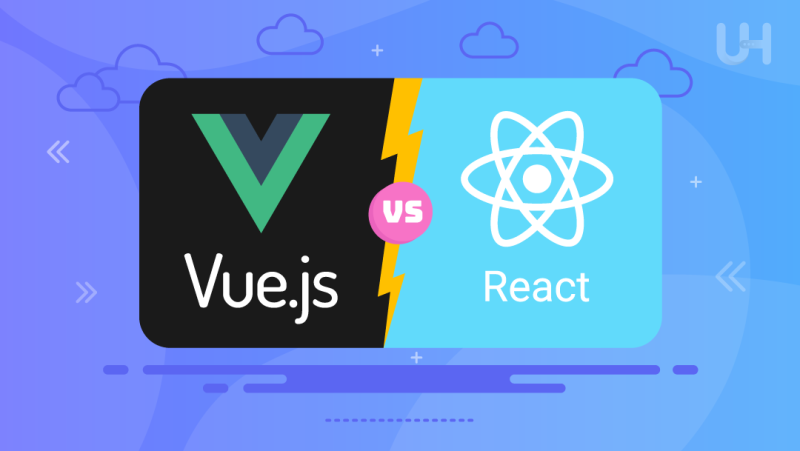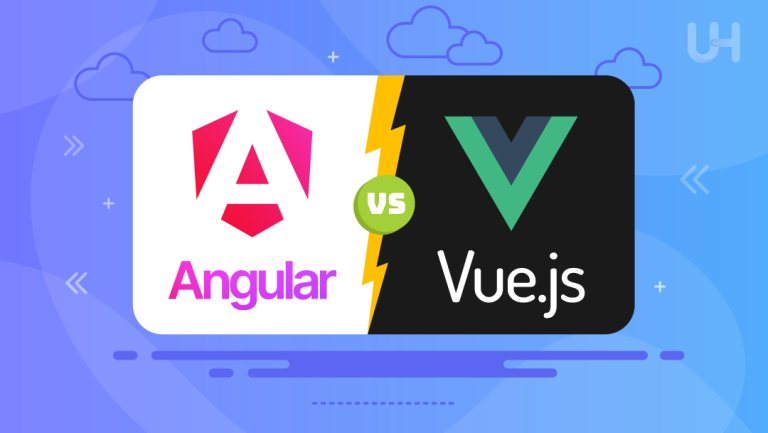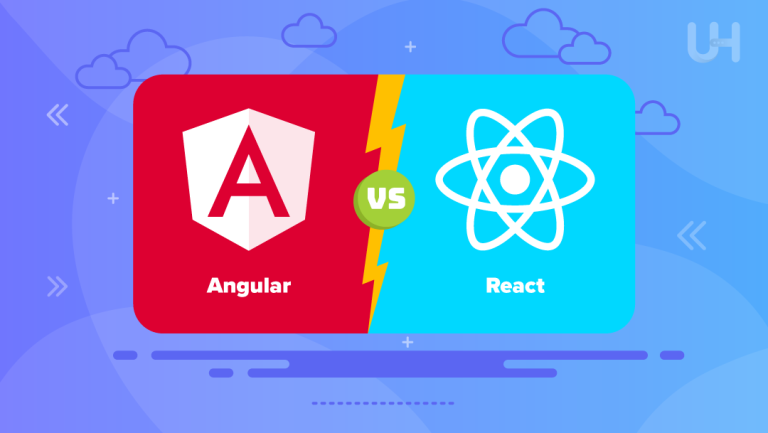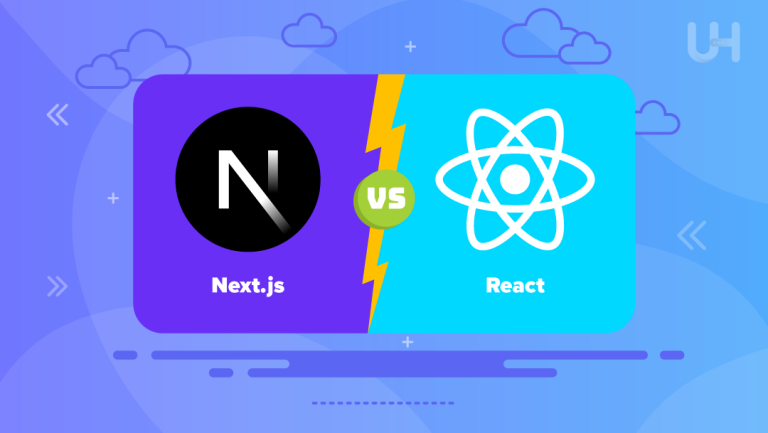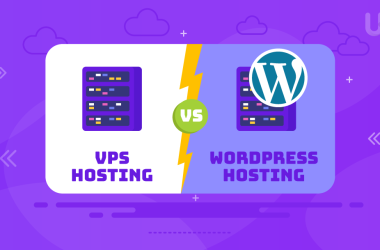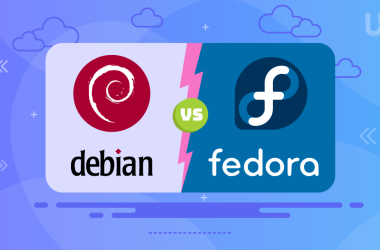Within the last few years, Vue.js and React have gained increasing momentum as two of the most popularly used JavaScript frameworks for creating dynamic web apps. Both come with extensive libraries, active large communities, and flexibility for various project requirements. However, they differ in ways that can significantly affect which one would be superior to meet specific development needs. Choosing between Vue.js vs React is difficult, especially for developers seeking an ideal balance between performance, simplicity, and scalability.
In this article, we will examine the differences between Vue.js vs React by observing what each framework offers, its pros and cons, and the differences that make them different. Whether you build small-scale projects or large applications, getting a grasp of these frameworks will go miles in helping you choose which one best fits the bill for your next project.
What is Vue.js?
Vue.js is a progressive view-layer framework from a JavaScript library for creating user interfaces and single-page applications. Evan You created it to combine the things he liked about Angular with those about React Components. Vue is often praised for its gentle learning curve, flexibility, and scalability of projects as they grow in complexity, especially when paired with tools like SSH hosting for secure, efficient project deployment and management.
Vue.js is component-based; applications are built by composing reusable components. Thanks to this design and Vue’s reactivity system, a developer can create interactive user interfaces with minimum effort. While Vue alone is powerful, it can also integrate seamlessly with other libraries or projects to augment its capabilities, further making it flexible for small and large applications.
Benefits
- Ease of Learning: Vue views simplicity as one of its core design goals, making it easier for beginners to pick up quickly.
- Two-way Data Binding: The idea here is that, with Vue, you get two-way data binding: the library synchronizes changes in the UI or in the model.
- Well-documented: One of Vue’s strengths is its excellent, well-organized documentation, which is easy to learn.
- Multi-Purpose Ecosystem: The Vue ecosystem is integrated into a single entity. Vue Router for routing, Vuex for state management, and Vue CLI to set up the project.
- Reactivity System: Vue’s reactivity system allows for very high-performance and responsive data updates.
Limitations
- Smaller Community than React: Although Vue is an up-and-coming community, it still has fewer members than React. This is reflected in its support and resources.
- Fewer Job Opportunities: React enjoys greater industrial use, which creates more job opportunities for React developers.
- Limited Plugins: Vue has fewer third-party plugins than React; hence, developers must implement specific features in certain scenarios.
What is React?
React is a JavaScript library developed by Facebook here in 2013 for building user interfaces. It coined its fame with component-based architecture, unidirectional data flow, and virtual DOM. React allows developers to create complex applications by splitting their UI into small components. Besides, with its virtual DOM for efficiently rebalancing the component tree and excellent tooling support, React is often the default choice for high-performance app development.
Unlike a full framework, React is actually a library. It concerns itself primarily with the view layer. Its focus allows the developer to decide what other libraries or solutions are being used to complete a project’s stack—be it for state management, routing, or form handling.
Benefits
- Large Community and Ecosystem: Due to the great community of React, there are many available resources, tutorials, and third-party libraries.
- Reusable Components: The designing of React is in ways that make it much easier to maintain large projects.
- Virtual DOM: React’s virtual DOM is highly performant and changes only the changed parts of the page.
- Rich Development Tools: React features a set of advanced tooling with React DevTools, amongst a sea of other tooling, which makes debugging and tweaks in development smooth.
- SEO-Friendly: One of React’s key features is server-side rendering, which can significantly boost SEO, especially when combined with SEO VPS hosting.
Limitations
- More Difficult Learning Curve: React enjoys an extremely steep learning curve because one has to get into the details of JSX, hooks, and the state of subjects.
- Dependency on Third-Party Libraries: React alone requires using additional libraries for things like routing or state management, which increases its complexity when setting up.
- Frequent Updates: React evolves quickly, leading to breaking changes that may require ongoing adaptation.
- JSX Syntax: Those who have not worked with JSX might find it confusingly combined with JavaScript and HTML.
Vue.js vs React: Similarities Between Both Frameworks
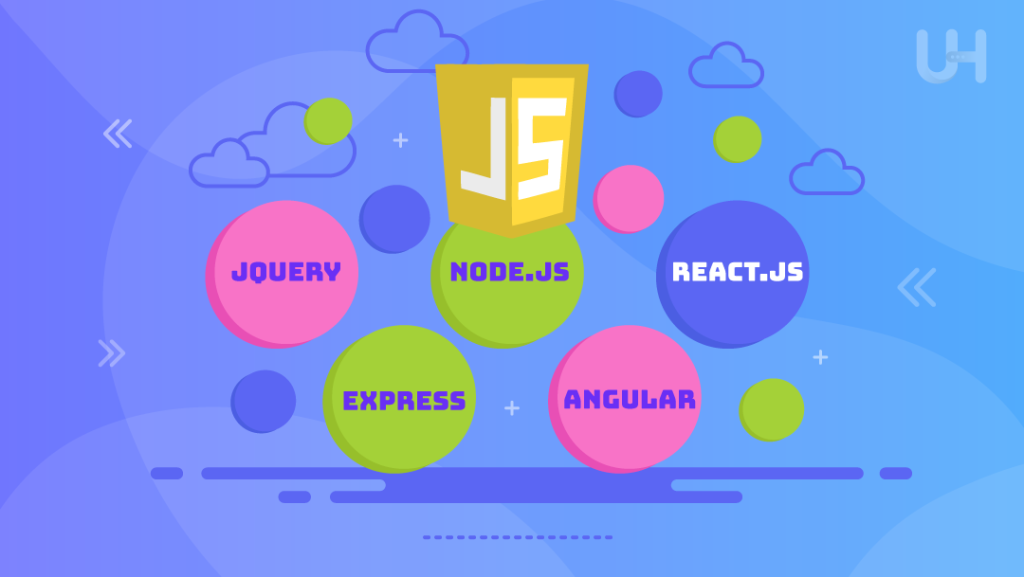
Vue.js and React share many features that make them quite energetic in front-end development. Despite their differences, both provide strong solutions that developers may count on when building modern web applications.
JavaScript
Both Vue and React are JavaScript-based frameworks, allowing developers to use modern JavaScript syntax, libraries, and features when building interactive applications. Their JavaScript frameworks also mean they offer great support for ES6+ standards and make using other popular libraries and utilities easier, giving developers flexibility and full control over their applications.
Architecture
Both Vue and React are component-based, meaning applications are built by piecing together isolated, reusable, and encapsulated components. This results in greater application maintainability, as you can make changes in part of the app without affecting the entire codebase. This component-based architecture allows for efficient project scaling.
Virtual DOM
Both Vue and React are virtual DOMs. This helps in optimizing application performance because of the reduced direct manipulations to the real DOM. Virtual DOMs update only affected components in the event of change, which makes rendering much quicker and improves performance, especially in large applications involving frequent changes in data.
Power Your Next Project with Reliable VPS Hosting!
Ready to launch your Vue.js or React project with the speed and reliability it deserves? UltaHost’s VPS Hosting offers high-performance, scalable solutions perfect for supporting complex applications built with top frameworks like Vue and React.
Community
Vue and React enjoy very active communities, with hundreds of different developers working in an extended environment featuring libraries and tutorials for easy learning and troubleshooting. Although the community is larger in React due to its age, the Vue community is also quite active and growing boastfully. Both of these communities contribute to extensive documentation, resources, and libraries, which in turn enhance developers’ productivity.
PWA Support
While both support Progressive Web Applications (PWAs), PWAs out of the box open up a path to creating applications that feel native to the user. PWAs mean your application loads a little faster, is more reliable, and is easier to use on mobile. This is necessary today when everyone expects an application to work well on mobile. The support with regard to PWAs positions Vue and React as an excellent choice for modern mobile-first indexing applications.
React vs Vue.js: Differences Explained
Although Vue and React have similarities, their differences may influence your choice of framework depending on your project’s needs. Here are the differences between Vue.js vs React:
| Feature | Vue.js | React |
| Learning Curve | Easier for beginners | Steeper due to JSX and ecosystem |
| Data Binding | Two-way binding | One-way binding |
| Ecosystem | Offers a cohesive ecosystem | Requires third-party libraries |
| Flexibility | Flexible but structured | Highly flexible, suitable for custom stacks |
| Performance | High due to reactivity system | High due to virtual DOM |
| Community Size | Smaller but active | Large with abundant resources |
| Adoption in Industry | Popular in Asia and startups | Widely adopted in large enterprises |
Vue.js vs React: What Are They Used For?
Both Vue and React can be useful in various types of applications, but each has certain areas where it excels.
Vue
- Small to medium-sized applications
- Single-page applications (SPAs)
- Projects requiring easy integration with existing codebases
- Applications with complex UI transitions and animations
React
- Large-scale, complex applications
- Applications requiring high performance and scalability
- Enterprise-level applications with multiple data streams
- Projects needing advanced routing, state management, and server-side rendering
Conclusion
Depending on the project’s size, complexity, and developer experience, the choice would have to go for either Vue.js or React because Vue.js grants simplicity with flexibility, which automatically puts a nail in favor of the smaller projects or the ones with lower levels of complexity. React is most suitable for larger applications because its performance and strong ecosystem play to the advantage of high demands in functionality and features. Understanding your project’s needs and knowing each framework’s strengths will better help you make an informed decision to support your goals.
For high-demand Vue.js or React projects, choosing a powerful, dedicated hosting solution can ensure unmatched performance and reliability. UltaHost gives you full control and resources tailored to handle the complexities of modern web applications.
FAQ
Which is easier to learn, Vue.js or React?
Vue.js has a simpler learning curve, while React’s JSX and ecosystem can be more challenging for beginners.
Can Vue.js or React handle large applications?
Yes, both are scalable. React is common in large enterprises, and Vue.js is also used in complex projects.
How do Vue.js and React manage data binding?
Vue.js supports two-way data binding; React uses one-way binding for easier debugging.
Which has a larger community, Vue.js or React?
React’s community is larger, but Vue.js also has a strong, growing base.
Are Vue.js and React SEO-friendly?
Yes, both support SEO when using server-side rendering (SSR).
Can I build PWAs with Vue.js and React?
Yes, both frameworks support Progressive Web App (PWA) development.
Which is easier to integrate into existing projects?
Vue.js is often easier to integrate, while React may need additional setup.





